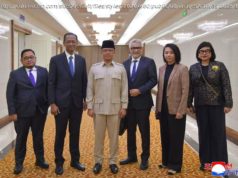Here’s what you need to know to start your day.
Good morning.
Here’s what you need to know:
• President Trump, on the Israeli leg of his nine-day foreign tour, presented Prime Minister Benjamin Netanyahu with what our reporting team describes as an unexpectedly blunt message: Solve the decades-old standoff with the Palestinians if you want peace with Arab nations.
Mr. Trump is expected to meet today with Mahmoud Abbas, the Palestinian leader, before leaving for Rome. Here’s his full travel schedule, which we’ re covering with traveling White House correspondents and foreign bureau chiefs.
_____
• Our analysts see President Trump’s declaration of commitment to Arab countries on his earlier stop, in Saudi Arabia, as a return to an American policy built on alliances with Arab autocrats — at the expense of Iran, whose president dismissed Mr. Trump’s visit as meaningless theatrics.
Social media users were obsessed with the mysterious glowing orb, above, that Mr. Trump, King Salman of Saudi Arabia and President Abdel Fattah el-Sisi of Egypt gathered around. (Spoiler: It’s just an illuminated globe.)
Back in the U. S., a letter from a top Democrat revealed that Mr. Trump’s former national security adviser, Michael Flynn, lied to Pentagon investigators about his income from Russian companies and contacts with Russian officials when he applied for a top-secret security clearance last year.
_____
• South Korea said North Korea’s most recent missile test, using a solid-fuel rocket, may have provided data that could advance the North’s weapons program.
Our science reporter looked to the history of the U. S. nuclear program for insights into North Korea’s — and the possibility that it is seeking to build a hydrogen bomb.
“I can’ t imagine they’ re not working on true thermonuclear weapons, ” one expert told him.
_____
• The police in Indonesia didn’ t just arrest 141 men for a “sex party” in a sauna in Jakarta — they also outed many of them with photographs released to news organizations.
Analysts said a recent spate of crackdowns appeared to be in preparation for the holy month of Ramadan, which begins this weekend.
_____
• And in India, our correspondent is tracking one of the country’s most hopeful narratives — the spread of the internet to vast multitudes of rural people.
She followed Babulal Singh Neti, above center, a convert to the wonders of the smartphone who is trying to convince his reluctant neighbors that “the whole world rests inside the mobile.”
• “I hope I have the chance to be a big boss.” But work is tough in Myanmar’s unregulated oil fields, where thousands of wildcat prospectors cluster, some lucky to collect even a barrel a day.
• Ford Motor replaced its chief executive with the head of its self-driving effort, after shares dropped 40 percent over three years.
• A Chinese wind-turbine maker is expanding into Wyoming and seeking the state’s ex-coal miners for permanent jobs.
• Defense stocks hit a high on news of the $110 billion U. S.-Saudi Arabia weapons deal, and Wall Street was higher. Here’s a snapshot of global markets.
• The corruption trial of the former South Korean president, Park Geun-hye, begins today. A judge is expected to decide whether to try Ms. Park and her confidante, Choi Soon-sil, separately. [Associated Press]
• China defended its right to protect its national security and interests in the first official response to a New York Times report on the dismantling of C. I. A. espionage operations in the country. A spokeswoman did not confirm or deny The Times’s report that more than a dozen C. I. A. sources were killed or imprisoned. [The New York Times]
• Monica Lewinsky wrote what she called “an obituary for the culture” that Roger Ailes created at Fox News. Many Americans first found the network because of its blanket coverage of her relationship with former President Bill Clinton. [The New York Times]
• A Thai general lashed out at unknown perpetrators over the bombing of a military-owned hospital in Bangkok that wounded 24 people, saying that even insurgents don’ t “choose a hospital as a target.” [The New York Times]
• AlphaGo, Google’s artificial intelligence player, begins a three-game series of Go with Ke Jie, the world’s 19-year-old top-ranked player, in Wuzhen, China. [Phys.org]
• A U. N. special rapporteur raised questions about whether counterterror legislation Japan’s lower house is likely to pass today would encourage the police to ignore civil liberties. [Reuters]
• “Madama Butterfly” redux. A radically revised version of Puccini’s classic opera seeks to address the Asian stereotypes the work helped perpetuate. [The New York Times]
• Melbourne’s “avolatte.” A cafe that serves lattes in the hollowed-out skin of an avocado is suffering the slings and arrows of social media. One post: “We have to stop these fads for the sake of humanity.” [Evening Standard]
• Don’ t despair. You can find reliable, affordable child care on the road.
• Embrace change in your marriage; it’s unrealistic to expect your spouse to remain the same person.
• Recipe of the day: Give New York strip steak a kick with a horseradish-mint glaze.
• In India’s Chettinad region, once-grand palaces disrupt the country’s rambling, rural charm. Our writer found mansion after mansion in various states of opulence and elegant decay.
• In memoriam. Stanley Greene was a leading war photographer who captured brutally honest images of conflicts in Afghanistan, Iraq and Chechnya. One of few African-American photojournalist in the field, he was 68.
• A team of scientists identified 52 genes linked to human intelligence — an “enormous success” in a field that remains mostly a mystery.
• F rom China with love? The Communist Party’s propaganda wing is sending Germany a superhero-size statue of Karl Marx. Our Beijing correspondent follows the debate over why: an attempt to reignite Marxism? A symbolic returning of defective goods? A joke?
If you’ re reading this with bifocals, you can thank Benjamin Franklin. He announced the creation of multifocal lenses on this day in 1785.
Like more than 200 million of the world’s current population, he had to squint to see clearly. Later in life, he carried two pairs of eyeglasses: one for distance, another for reading.
The American overachiever solved his vision problem by piecing together two lenses, cut in half, into a single frame. “By this means, as I wear my spectacles constantly, I have only to move my eyes up or down, ” he wrote to a friend .
Franklin, who is long credited (although debated) as the inventor of the split-lens spectacles, also sketched his D.






